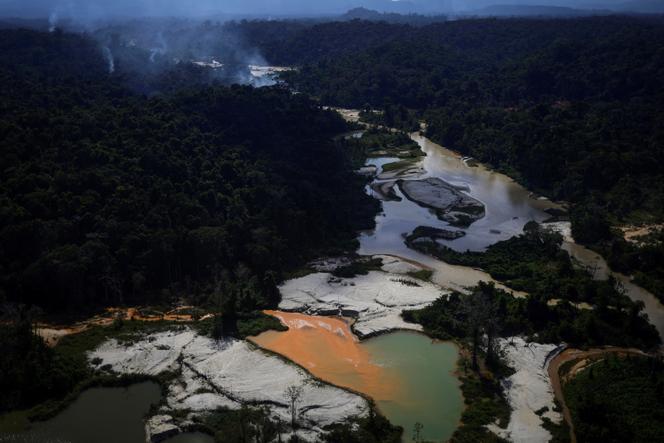


One year after the Brazilian government attempted to expel the thousands of illegal gold miners who caused a health crisis in the Yanomami Indigenous territory in the state of Roraima (in the northern Amazon), the local population has denounced the resumption of mining activities on their territory.
"We don't know how many there are, or how many mines remain active, but we do know that gold panning is increasing every day," said Dario Kopenawa Yanomami, a leader of the Indigenous Yanomami people, on September 14, 2023, in the Valor Econômico newspaper. "The Yanomami can no longer sleep because of the noise of the planes [used by the gold miners to refuel and transport the gold], engines and machines," he said.
On site, the health situation is worrying. "Diseases are back," said Dinamam Tuxa, the coordinator of the Articulation of Indigenous Peoples of Brazil. According to the Ministry of Health, 308 Yanomami died between January and November 2023, almost as many as in 2022 (343), notably as a result of pathologies caused by parasites (36), such as malaria, or malnutrition (29). Of the deaths in 2023, more than half (162) were children under the age of 4.
These diseases are a direct consequence of gold panning: Deforestation, linked to the construction of mine workings, and stagnant water in abandoned pits encourage the proliferation of parasite-carrying mosquitoes. In addition, the mercury used to separate gold from ore contaminates rivers and kills wildlife, depriving the 30,400 or so Indigenous people of part of their livelihood.
Brazil's president, Luiz Inacio Lula da Silva, had promised at the start of his term in 2023 that he would put an end to illegal gold mining. The government of his predecessor, far-right President Jair Bolsonaro (2019-2022), reduced funding for Ibama, the national environmental agency, and Funai, responsible for protecting Indigenous rights. Bolsonaro's administration also encouraged the massive influx of gold miners into the region. The death of 570 Yanomami children under the age of 5 from preventable diseases during his term of office, and images of skeletal Indigenous people, sparked outrage.
Accusing his predecessor of genocide, Lula was quick to act. On January 22, 2023, he declared a health emergency in the territory and, 10 days later, closed the airspace over the Yanomami Indigenous territory, which covers 9.6 million hectares, in order to cut off supplies to gold miners.
In early February 2023, the government also launched a joint operation involving the army, federal police, Ibama and Funai to destroy the mines and equipment belonging to the gold miners. Sixty-one tonnes of food were also distributed to the Yanomami, and some 1,000 were rushed by helicopter to a health center in Boa Vista, the capital of Roraima state. According to the government, the operation was effective: On May 1, Sonia Guajajara, the minister for Indigenous peoples, announced that between 75% and 80% of the estimated 20,000 gold panners in the territory had left.
You have 45% of this article left to read. The rest is for subscribers only.
